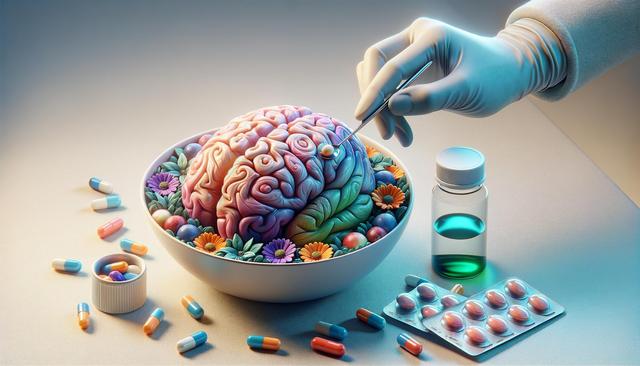What Causes Dementia?
To better understand dementia treatment, it’s important to first answer the question: what causes dementia? Dementia is not a single disease but a general term that describes a range of symptoms associated with cognitive decline. The condition is most commonly linked to Alzheimer’s disease, but other types include vascular dementia, Lewy body dementia, and frontotemporal dementia. Each type has its own specific triggers, but overall, dementia is caused by damage to brain cells that interferes with their ability to communicate. This cell damage leads to the cognitive and behavioral symptoms commonly observed in those affected.
So, what is the main cause of dementia? The leading cause is Alzheimer’s disease, which is characterized by the accumulation of abnormal proteins in the brain. Other contributing factors include reduced blood flow to the brain, strokes, and in some cases, genetic mutations. Lifestyle factors, such as poor diet, lack of exercise, and smoking, may also increase the risk. Understanding these causes helps inform both treatment and prevention strategies.
Signs and Early Detection
Recognizing the early signs of dementia is crucial for timely intervention. So, what is the first signs of dementia? While symptoms can vary, common early indicators include:
- Short-term memory loss
- Difficulty finding the right words
- Problems with planning or organizing
- Confusion about time or place
- Changes in mood or personality
Early intervention for dementia care can lead to better management of symptoms and potentially slow the progression of the disease. Evaluations typically include neurological exams, cognitive testing, and brain imaging. Once diagnosed, healthcare providers can tailor a care plan that addresses the individual’s specific type and stage of dementia.
It’s important to note that early detection allows for more effective use of medications and therapies that can stabilize memory and thinking skills. It also gives families time to plan for future care needs and make necessary adjustments to living environments or daily routines.
Treatment Options and Management
While there is currently no cure for dementia, several treatment strategies can help manage symptoms and improve quality of life. Treatments include medications that regulate neurotransmitters in the brain, which may help with memory, mood, and behavior. Other supportive therapies, such as occupational therapy and cognitive stimulation, can also be beneficial.
Managing dementia involves a combination of medical treatment and lifestyle support. Some of the key components include:
- Pharmacological treatments to manage symptoms
- Behavioral therapy to support emotional well-being
- Physical activity tailored to individual ability
- Structured routines and memory aids
In addition to clinical treatments, a supportive home environment and caregiver education play a vital role in managing the condition. Regular check-ups and adjustments to the care plan ensure that the approach remains effective as the condition progresses.
Prevention Strategies and Lifestyle Choices
Research continues to explore what can you do to stop dementia or at least delay its onset. Although dementia cannot always be prevented, certain lifestyle changes have been shown to reduce the risk significantly. Among the most effective prevention strategies are:
- Maintaining a heart-healthy diet
- Engaging in regular physical activity
- Staying mentally and socially active
- Managing chronic conditions like diabetes and hypertension
- Avoiding smoking and excessive alcohol use
These steps align with the 5 ways to prevent dementia often recommended by healthcare professionals. A balanced lifestyle that supports both physical and mental health may help preserve brain function and delay cognitive decline. It’s also beneficial to get regular health screenings and address any cardiovascular issues, as these are closely linked with some forms of dementia.
Building these habits early in life can have long-term benefits, but it’s never too late to start. Even small changes can have a meaningful impact on overall health and brain function.
The Role of Caregivers and Support Systems
Dementia care extends beyond medical treatment; it involves robust support systems for both patients and caregivers. As the condition progresses, individuals may require help with daily tasks, emotional support, and safety monitoring. Family members often become primary caregivers and must adapt to the changing needs of their loved ones.
Support systems can include:
- Caregiver support groups
- Professional in-home care services
- Community programs for cognitive engagement
- Access to medical specialists and therapists
Caregivers play a key role in ensuring consistent care and emotional support. They are often the first to notice changes in behavior or health status, which makes their involvement critical in adjusting treatment plans. Education on dementia, including what causes dementia and how it progresses, empowers caregivers to provide informed and compassionate care.
Additionally, legal and financial planning should be part of the long-term strategy. Establishing power of attorney, planning for long-term care, and discussing end-of-life wishes can help reduce stress later on. Coordination among healthcare providers, family members, and care teams ensures a holistic approach to dementia management.
Conclusion: Empowering Action Through Knowledge
Understanding dementia, from what causes it to how it can be managed and potentially prevented, empowers individuals and families to take proactive steps. While the journey may be challenging, early detection, informed treatment decisions, and lifestyle adjustments can make a significant difference. By recognizing the first signs, exploring early intervention for dementia care, and applying 5 ways to prevent dementia, individuals can contribute to better outcomes and quality of life. Whether you’re a caregiver, a family member, or someone concerned about cognitive health, knowledge and preparation are powerful tools in addressing dementia.




Leave a Reply